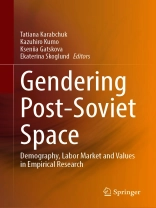This volume combines approaches from three disciplines – economics, sociology, and demography – and empirically analyzes the key aspects of the labor market and social demography processes in post-Soviet transitional societies while focusing on the gender perspective. Here, readers will find empirical studies on such countries as Armenia, Azerbaijan, Belarus, Estonia, Georgia, Kazakhstan, Kyrgyzstan, Russia, Tajikistan, Ukraine, and Uzbekistan. The volume contributes to the literature by addressing the lack of academic empirical research on gender difference issues in the labor markets of post-Soviet countries as well as gender inequalities in fertility preferences, gender disparities among the youth and elderly, the gender pay gap, gender differences in employment, and female voices. The book brings together researchers of different disciplines from a variety of countries, distinguishing this project as international and interdisciplinary. The authors use the quantitative survey micro-data approach as well as the qualitative methods of interview data analysis to provide a comprehensive and detailed overview of the economic and social developments in the region regarding gender differences. The volume consists of three parts tackling the following topics: 1) gender differences and demography (family formation and fertility, youth and elderly employment); 2) gender differences and labor market (gender wage gap, motherhood wage penalty, gender differences among freelancers, and women in STEM science); and 3) gender differences, well-being, and gender equality attitudes (women’s voices, women’s collective actions, gender equality attitudes, and spending patterns of housewives).
Cuprins
Gender Differences and Demography: fertility, youth and elderly.- Gender Differences and Labour Market Outcomes.- Women’s Political Empowerment, Gender Equality Attitudes and Family Income and Well-being.
Despre autor
Karabchuk Tatiana, Ph.D., is Associate Professor at the Department of Government and Society, College of Humanities and Social Sciences, UAE University, Al Ain. Her research interests include labour market studies, demography, happiness and cross-country comparative studies in education and employment. Her articles on youth employment and fertility, informal employment, family values, job stability and subjective well-being are published in such journals as The ANNALS of the American Academy of Political and Social Science, Journal of Happiness Studies, Service Industries Journal, and Asia-Pacific Population Journal among others.
Kazuhiro Kumo, Ph.D., is a Full Professor at the Institute of Economic Research, Hitotsubashi University, Tokyo. He is the author of Migration and Regional Development in the Soviet Union and Russia (Beck Publisher Russia, 2003) and Demography of Russia (with T. Karabchuk and E. Selezneva, Palgrave Macmilan, 2017), along with articles published in Europe-Asia Studies, Post-Communist Economies, Comparative Economic Studies and Polar Science, among others. His research focuses on demography, migration, and economic geography of the former Soviet Union and Russia.
Kseniia Gatskova, Ph.D., is a Researcher, quantitative sociologist working at the Economics Department of the Leibniz Institute for East and Southeast European Studies. Her research interests encompass post-Soviet transformation, social inequality, migration, and gender studies as well as methods of empirical social research. Her recent publications appeared, among others, in the Journal of Comparative Economics, International Migration, Feminist Economics, and Social Indicators Research.
Ekaterina Skoglund, Ph.D., is a Management Research and Dissertation Coordinator at the EU Business School in Munich and the Associated Researcher at the Leibiniz Institute for East and Southeast European Studies (IOS Regensburg). Ekaterina published successfully in such journals as The Journal of Economic Inequality, Economics of Transition, IZA World of Labour, and Economic Systems. Her scientific and professional interests include applied research related to labor market and gender economics topics, specifically focused on the usage of subjective measures.












